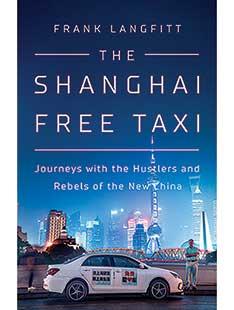
NPR correspondent Frank Langfitt ’86 arrived in Shanghai in 2011 and quickly sensed the magnitude of the country’s transformation since he had last been in China, seven years earlier. During a journalistic stint in Beijing from 1997 to 2002 he witnessed the country’s manufacturing boom and the emergence of a middle class. By 2011, however, manufacturing had moved out of the big cities, leaving a thriving middle class competing for jobs in finance and tech sectors. In downtown Shanghai, an upper class dominated, whizzing around in luxury cars, patronizing posh boutiques, and paying the equivalent of millions of dollars for apartments.
Langfitt needed to understand what it meant, where it was all heading. But he knew China’s authoritarian government was surveilling citizens and jailing dissidents. To create a safe space, Langfitt, who had driven a taxi in a summer job, deployed a novel approach: taxicab as confessional. Throughout his five years in Shanghai, he drove a free cab, chauffering ordinary people, hearing about their lives, then describing them in short stories for NPR (Langfitt first wrote about this in an essay for PAW, at bit.ly/langfitt). In his new book, The Shanghai Free Taxi: Journeys with the Hustlers and Rebels of the New China (PublicAffairs), he shares a deeper version of his experiences by focusing on 16 of his riders, whose lives reveal nuanced social, economic, and political trends among Chinese people.
“I had no idea if anybody would get in the taxi, and I had no idea where it would take me,” says Langfitt. “I was amazed at how much I learned by just getting to know these characters and following them on their journeys — and helping them a little bit.” Langfitt, who cultivated these relationships for years, actually helps his subjects a lot — he got one a job, drove two others to their weddings in rural China, and spent several days on the road helping a woman investigate the disappearance of her sister.

Langfitt weaves a narrative of a country whose citizens have had to adapt to major cultural transformations in a single generation. He highlights developments such as the breakneck speed of urbanization and the country’s shift to a service economy. He also shows through several scenes that even in everyday conversation people often censor themselves. “The Communist Party knows that if people can’t talk about politics, they can’t begin to work through how they might change the system,” he writes after one such episode. “Every curtailed conversation, every hesitation, is one more tiny victory for authoritarianism and the political status quo.”
One of Langfitt’s passengers is regularly imprisoned inside a “black jail” for speaking out against the government for razing her family home and offering no compensation. He also discusses the incarceration and “re-education” of the minority Muslim population in the far northwest and other human-rights abuses. (One involves a mother who became pregnant again during the country’s erstwhile One-Child Policy — she was abducted and given an involuntary abortion.)
He also describes government propaganda that is increasingly nationalistic and often asserts that foreign enemies have diminished its rightful global prestige. “China is at a big turning point, and its government is going in a direction that Americans should be very concerned about,” he says, citing China’s rising influence on the world stage. “I hope readers will be able to separate the people — who in many ways have done remarkable things and have suffered tremendously — from the policymakers in Beijing.”
Langfitt believes political discord in the Western world has helped China. While most of his characters fled tiny villages for the glitz of Shanghai, one enjoyed a comfortable life as a daughter of Communist Party insiders. She disdained her parents’ connection to the party and moved to the United States for school. Then Donald Trump was elected. “She ended up having a much more jaundiced view [of America], and she came back to China, something I never thought she’d do,” Langfitt says. He thinks this demonstrates that when the United States fails to espouse higher values, “it gives up the ‘soft power’ it could have to actually have a positive influence in an authoritarian country like China.”
Langfitt left Shanghai in 2016 and moved with his family to London for what he expected to be a “quiet posting.” The Brexit vote took place the very next week. “As an American reporter in Britain who’s spent a decade in China, I’m surprised by how many similarities I see,” he says, comparing American and British politicians who espouse anti-immigration rhetoric to China’s incarcerating its Muslim citizens. “I think we’re in an age of identity and growing nationalism, and I think we’re going to be in this age for quite a while,” he says. “It’s a tricky and, potentially, a dangerous time.”











No responses yet